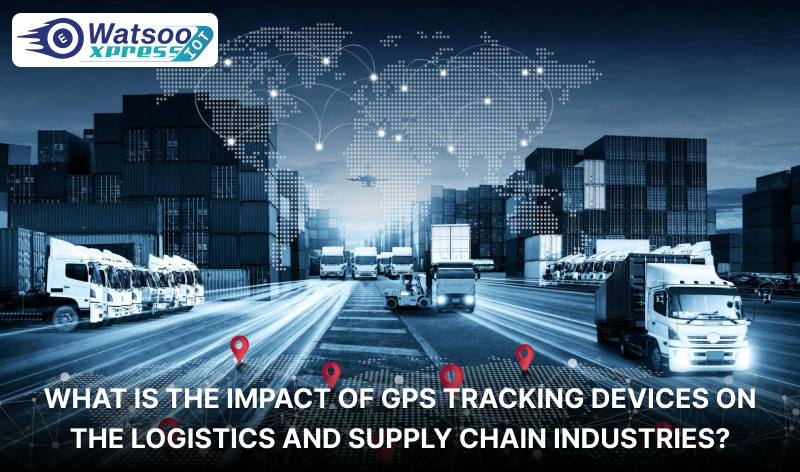As a fleet manager or owner of a logistics business, what you demand is complete visibility into your fleet’s activities. And with the introduction of IoT devices into logistics, the industry has taken on a new shape. These devices have enhanced efficiency, visibility, and operational effectiveness. Thus, one such product, a GPS tracking device, is becoming a common vocabulary for logistics. It enables real-time tracking that leads to precise location monitoring of shipments, vehicles, and assets.
Additionally, you can be dependent on tracking throughout the supply chain. Further, the information allows companies to optimise routes, which reduces delivery time. Hence, we can see that IoT products like vehicle GPS tracking devices are changing the outlook of the logistics industry. Let’s delve into the blog further to understand the need for such devices.
Impact of the Integration of Vehicle GPS Tracking Device into the System
The integration of vehicle GPS tracking devices has had a profound impact on the logistics and supply chain industries. It has transformed the way businesses manage and optimise their operations. Here are six valuable points highlighting the impact:
Real-Time Visibility
GPS Tracking Devices for trucks provide real-time location data for vehicles, shipments, and assets. This visibility allows logistics companies to monitor the entire supply chain. Further enabling precise tracking of goods from origin to destination. Real-time information enhances decision-making by providing insights into delays. Additionally, it allows for proactive adjustments to routes and schedules.
Optimised Route Planning
GPS tracking enables dynamic and optimised route planning. Logistics companies can analyse historical data and current traffic conditions. Thus, it helps to identify the most efficient routes. Which further helps in reducing fuel consumption. Moreover, it minimises transit times and optimises resource utilisation. It enhances operational efficiency and reduces costs associated with fuel and vehicle maintenance.
Enhanced Security
GPS tracking enhances security by deterring theft and enabling quick recovery in the event of unauthorised access. Its live tracking capability allows companies to implement geo-fencing. Which further triggers alerts if shipments deviate from predefined routes or locations. This proactive security measure helps safeguard valuable cargo and reduces the risk of theft.
Improved Customer Service
Provides real-time information about the location and estimated time of shipment arrival. Thus, it aids in improving customer satisfaction, which is a must for a company. You can offer your clients precise delivery windows and timely updates. This, in turn, strengthens customer relationships and builds trust.
Efficient Resource Management
GPS tracking devices assist in optimising resource management. It monitors vehicle usage, identifies idle time, and streamlines maintenance schedules. This data-driven approach allows companies to reduce operational costs. Which further extends the lifespan of vehicles and enhances fleet efficiency. Predictive maintenance based on GPS data helps prevent breakdowns. Additionally, it reduces downtime and improves service reliability.
Data-Driven Analytics
GPS tracking generates a wealth of data that can be leveraged for analytics. By analysing historical trends and patterns, companies can make informed decisions. Thus, you can identify areas for improvement and implement strategic changes.
In conclusion, GPS tracking devices play a pivotal role in reshaping the logistics and supply chain industries. These advancements collectively contribute to a more agile, responsive, and cost-effective supply chain ecosystem.
Future of Vehicle GPS Tracking Devices in Logistics and the Supply Chain
The future of GPS tracking devices in the logistics and supply chain industry holds exciting possibilities. It is driven by technological advancements and evolving market demands. Here are four interesting points that highlight potential future developments:
Integration with Advanced Technologies
The future of GPS trackers involves seamless integration with advanced technologies such as artificial intelligence (AI) and machine learning. AI algorithms can analyse vast amounts of data collected by GPS. Further, it provides predictive insights, optimises routes, and predicts maintenance needs. Additionally, improving overall supply chain efficiency. Machine learning models can continuously adapt and refine recommendations based on changing conditions.
Blockchain for Security and Transparency
As blockchain technology gains prominence, the integration of GPS with blockchain in logistics can offer security and transparency. It ensures secure and tamper-proof recording of location data, preventing unauthorised alterations. This technology can be particularly valuable in verifying the authenticity of goods. Further, it can prevent fraud and provide a transparent and traceable record of the entire supply chain journey.
IoT Ecosystem Expansion
GPS tracking devices will likely be part of a broader Internet of Things (IoT) ecosystem within the logistics industry. Integration with various sensors beyond location tracking, such as temperature and humidity sensors, will enable comprehensive monitoring of environmental conditions during transportation. This expanded IoT ecosystem can provide a holistic view of the supply chain. Additionally, it allows proactive management of diverse variables that impact the quality and safety of goods.
In summary, the future of GPS trackers in logistics and supply chain management involves integration with advanced technologies like AI, blockchain, and IoT, as well as leveraging the capabilities of 5G connectivity. These developments promise enhanced security, transparency, efficiency, and responsiveness, positioning GPS trackers as critical components in the evolution of modern supply chain ecosystems.
Conclusion
By taking a close look at the functionality of vehicle GPS tracking devices, we can conclude they are becoming the need of the era. The device has ushered in a transformative era for the logistics and supply chain industries. The real-time visibility it provides empowers businesses to make informed decisions. Further, it optimises routes and bolsters security measures. Additionally, it enhances customer service by making deliveries on time. Data-driven analytics collectively contribute to a more agile and cost-effective supply chain ecosystem.
Looking ahead, the future of GPS tracking devices for trucks holds immense promise. Embracing these technological advancements promises heightened efficiency. Additionally, we can expect transparency in the system. Moreover, it positions GPS trackers as indispensable tools in navigating the evolving landscape of modern supply chain management.


